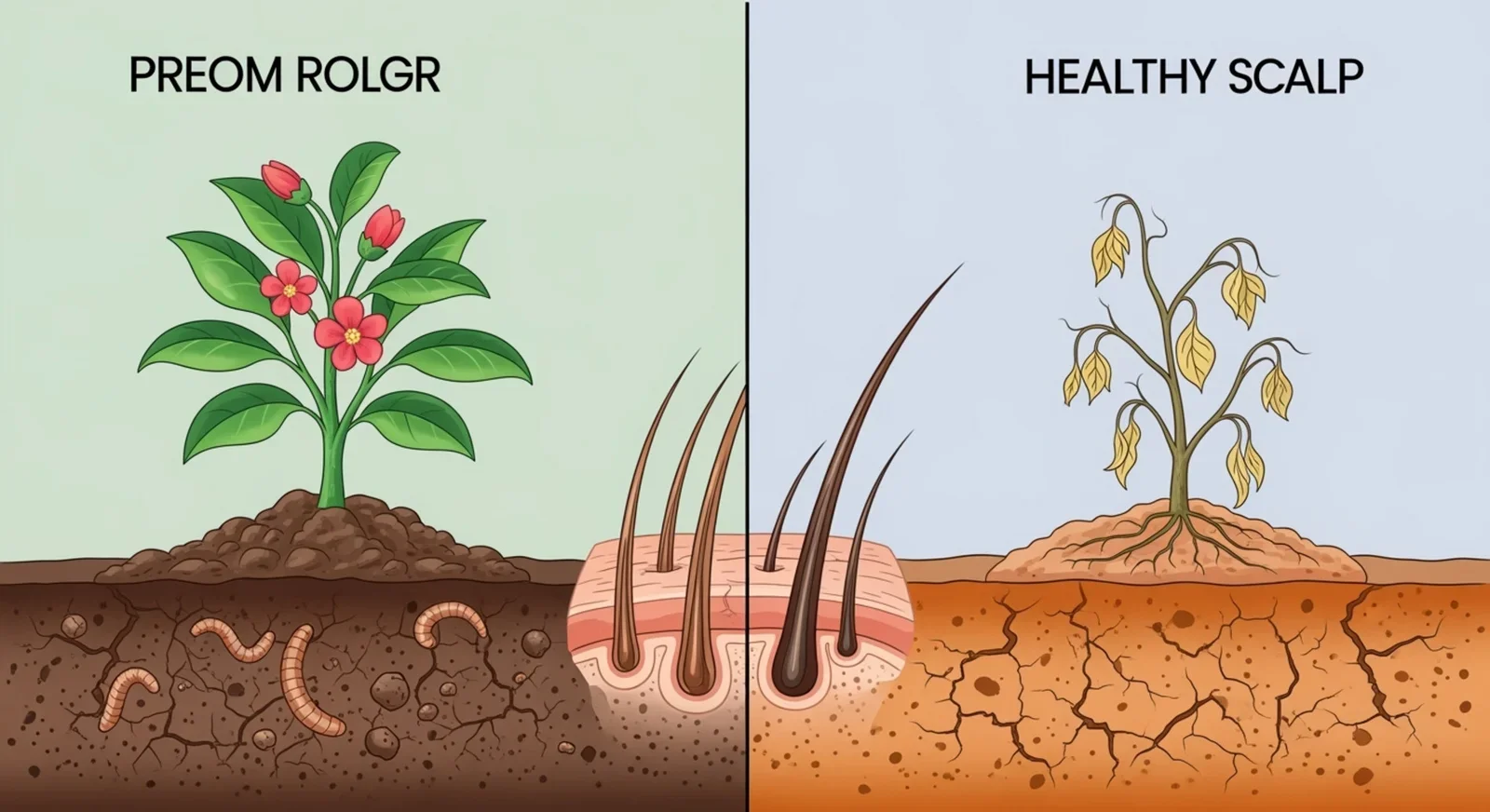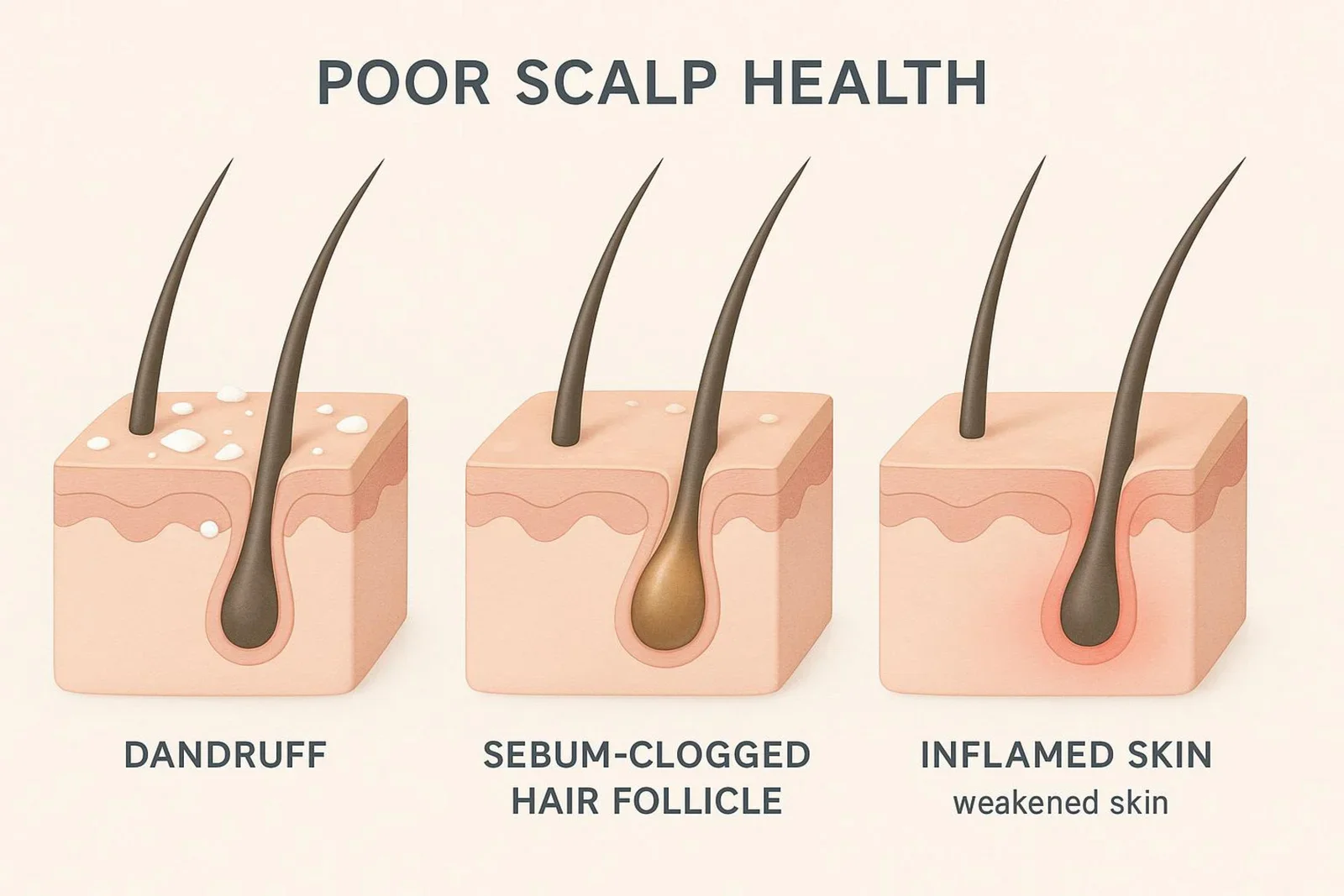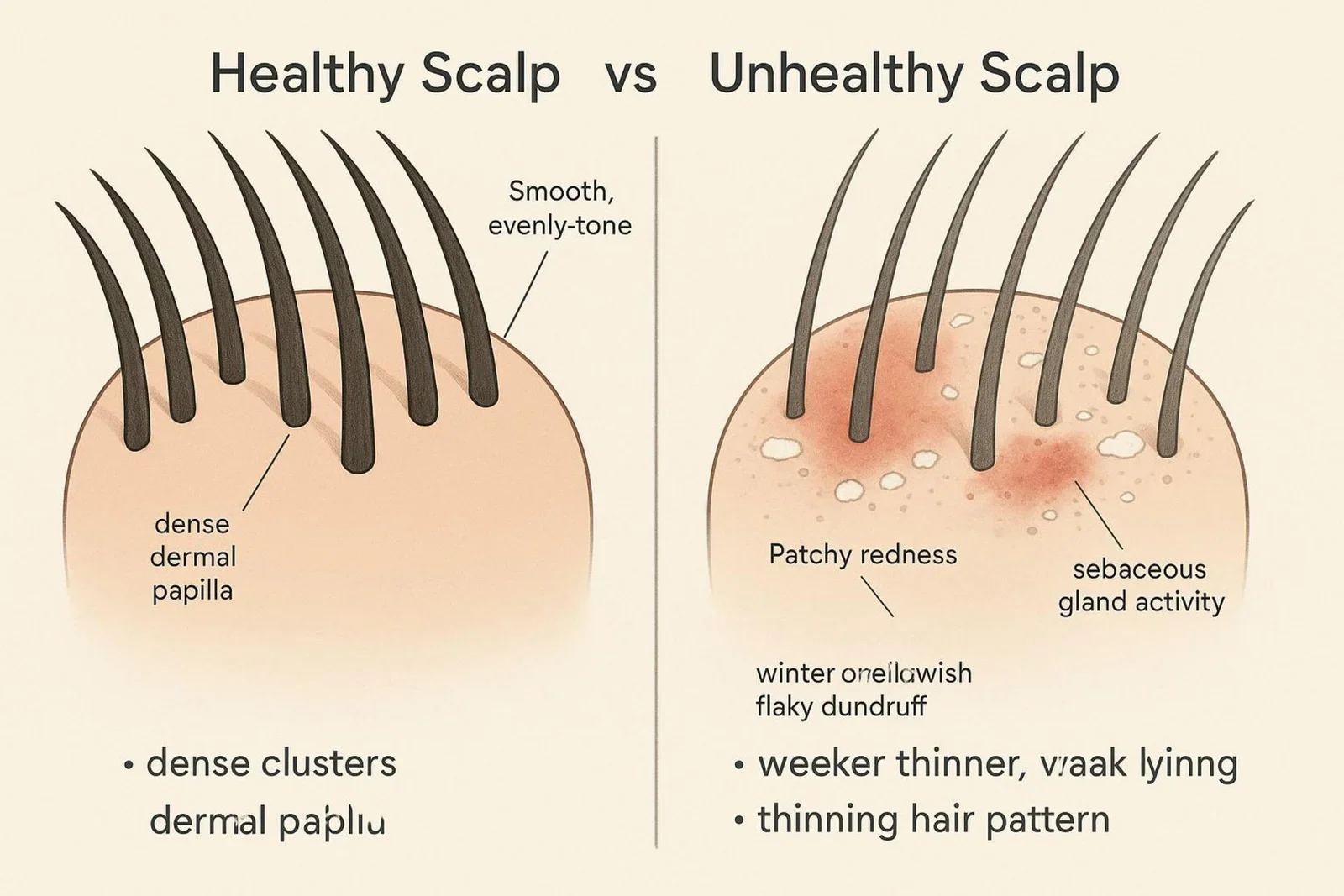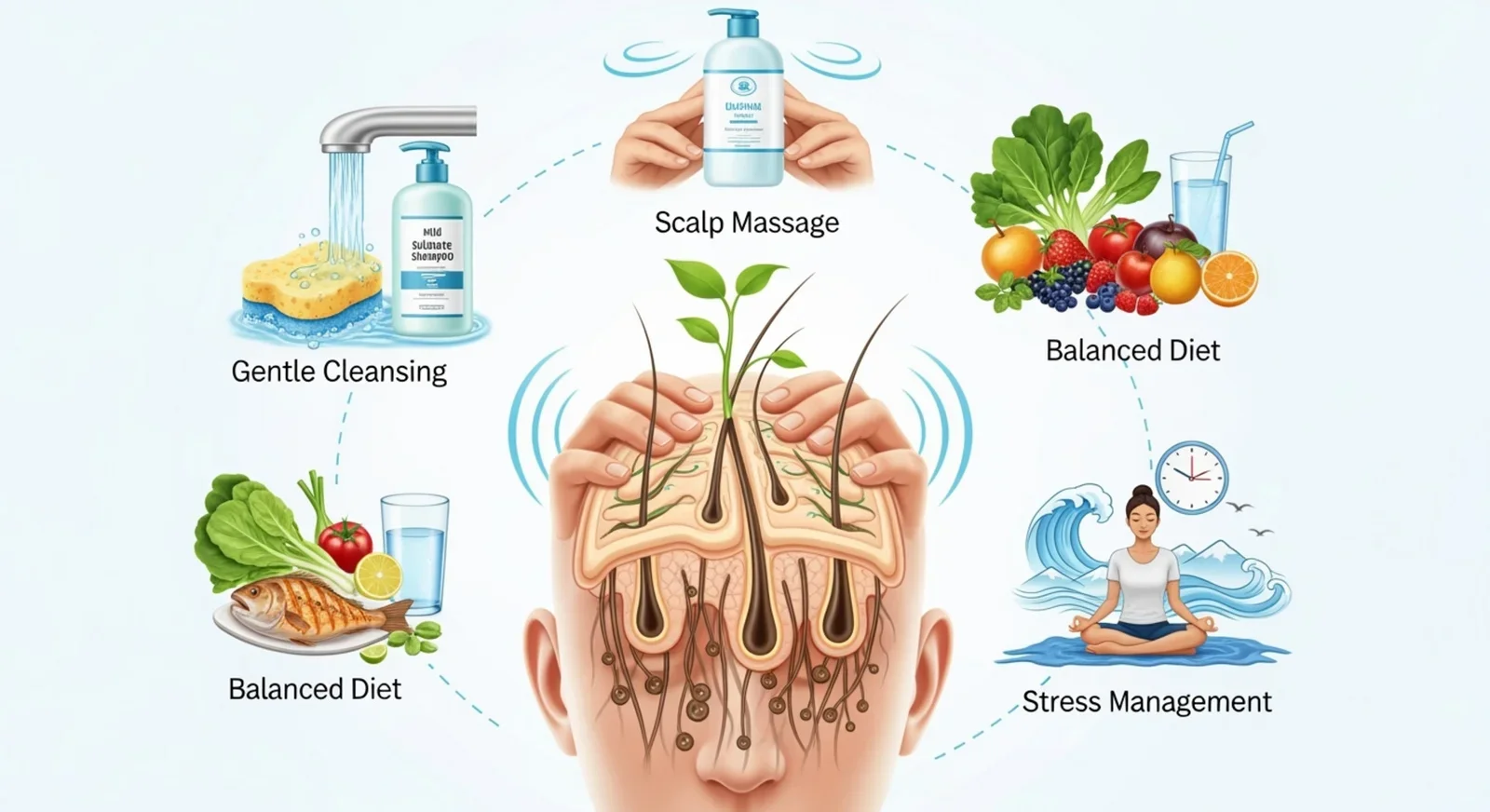The Importance of Scalp Health for Hair Growth
Have you ever wondered why some people have thick, shiny hair while others deal with thinning or weak hair? Often, the answer isn't just in the hair itself but in the scalp. Just as healthy plants need good soil, strong and beautiful hair needs a healthy scalp. If you ignore your scalp, you may deal with problems like dryness, itchiness, dandruff, and even hair loss. If you want fuller hair, it's time to give your scalp the care it needs.
What Is Scalp Health and Why Is It Important for Hair Growth?
The scalp is an extension of the skin on your face and contains about 100,000 hair follicles. Each follicle is responsible for growing a strand of hair. A healthy scalp is clear, keeps a good oil balance, and doesn't get inflamed, red, or itchy. When you take care of your scalp, it creates the right conditions for hair to grow well.
The state of your scalp affects how well your hair grows and how strong it is. Dr. Sanusi Umar, a dermatologist, says the scalp is like soil for plants; if the soil isn't good, the plants won't do well. In the same way, if your scalp isn't in good shape, your hair might suffer. Focusing just on the strands and ignoring the scalp is a common mistake in hair care.
Why a Healthy Scalp Helps Hair Growth
Better nutrition for hair follicles: A clean and balanced scalp allows hair follicles to get the oxygen and nutrients they need.
Stronger hair: It supports the natural process your hair undergoes even before coming through the scalp, leading to stronger, healthier strands.
Best use of products: If your scalp is clean, hair care products can work more effectively because they can actually reach your roots instead of sitting on top of buildup.
Problems Caused by Poor Scalp Health
Dandruff and itchiness: If your scalp produces too much or too little oil, you might get an itchy, flaky scalp.
Clogged follicles: Buildup of dirt, oil, and dead skin blocks hair follicles, slowing growth and leading to weak hair.
Risk of permanent hair loss: Ongoing inflammation and scalp conditions can eventually damage follicles so much that hair stops growing permanently.
Less shine and more breakage: Damage to the scalp can make hair look dull and break easily.
How Does the Scalp Affect the Hair Growth Cycle?
The scalp is not just passive skin under your hair-it actively impacts the way your hair grows, rests, and falls out. Each hair goes through a cycle (growth, rest, and shedding), and the scalp has a big effect on all these stages. A healthy scalp helps this cycle move normally, making sure your hair stays healthy and full.
If the scalp's balance is thrown off by irritation or buildup, the hair cycle can be affected. Hair may fall out too soon or stop growing as long or as strong as it should.
| Phase | What Happens | How Scalp Health Matters |
|---|---|---|
| Anagen (Growth) | Hair actively grows (2-7 years) | Good blood flow and nutrition from a healthy scalp support longer growth periods and stronger hair |
| Catagen (Transition) | Growth stops, follicle shrinks (2-3 weeks) | Scalp problems may push hair into this phase too soon |
| Telogen (Rest/Shedding) | Hair rests then falls out (2-4 months) | Inflamed or stressed scalps may cause more hairs to enter and stay in shedding phase at the same time, leading to noticeable hair loss |
How Follicle Function Links to Scalp Condition
The health of each hair follicle depends on its surrounding scalp. Your scalp produces sebum (natural oil) to keep the skin moist. If there's too much, your scalp gets greasy; too little and it's dry and irritated. Balanced oil production, kept by the right pH (5-6), helps the scalp's tiny ecosystem (its microbiome) stay healthy, allowing follicles to do their job well.
Other issues like high oxidative stress (from pollution, sunlight, or certain scalp conditions) can hurt the way hair is built inside the scalp, making it fragile before it even grows out.
Which Scalp Conditions Affect Hair Growth?
Common scalp issues can really slow down or weaken hair growth. Knowing about them helps you spot problems early and take action:
Dandruff, Seborrheic Dermatitis, and Psoriasis
Dandruff: Causes flaky white skin and itchiness, often a sign of mild seborrheic dermatitis. It makes your scalp shed skin cells too quickly.
Seborrheic Dermatitis: You get oily, red, and scaly patches, not just on the scalp but sometimes beyond it. Caused mostly by overgrowth of a scalp yeast called Malassezia.
Psoriasis: Leads to thick, red, scaly patches with silver flakes. It is linked with both yeast and immune problems and can speed up hair shedding or even cause bald patches if severe.
| Condition | Main Features | Impact on Hair |
|---|---|---|
| Dandruff | Flakes, mild itching | Can weaken hair, cause breakage |
| Seborrheic Dermatitis | Red, oily, itchy, scaling skin | Inflammation hurts hair quality |
| Psoriasis | Thick red patches, silver scales | May lead to hair loss and rough hair |
Scalp Aging and Oxidative Stress
As you age, your scalp ages too. Sun exposure, pollution, and your own genetics can damage scalp skin and make it harder for your hair to grow well. Oxidative stress happens when bad molecules called free radicals outnumber the good defenders (antioxidants) in your system. This damage makes your scalp less able to support healthy hair and can make new hair more fragile.
Other Medical Issues Affecting Hair
Conditions like eczema (atopic dermatitis) and certain immune diseases also harm the scalp, causing itch, irritation, and hair loss. Even when these conditions seem mild, the inflammation may still damage hair growth. If you keep having scalp pain, flaking, or heavy shedding, you should see a doctor for a full check.
What Are Signs of an Unhealthy Scalp?
If your scalp isn't healthy, it will usually show clear warning signs. Spotting these early can help you fix problems before they harm your hair. Here's what to look out for:
Itching: If you're scratching often, your scalp may be too dry, oily, or irritated by products or microbes.
Redness: Shows inflammation, which can be bad for hair growth.
Flaking or dandruff: White or yellow flakes can point to issues like seborrheic dermatitis.
Bumps or scabs: Could be infection or irritation.
Unusual oiliness or dryness: Too much or too little oil is a problem for scalp (and hair) health.
Excess hair loss: More hair in the brush or shower drain can mean your scalp needs attention.
If these symptoms last or get worse, it's a good idea to see a dermatologist for advice and possible testing.
What Can Harm Your Scalp?
Your scalp faces a lot of challenges every day. Both what you do and where you live can upset its balance. Here are some common problems:
Environmental and Lifestyle Factors
Pollution: Dust and chemicals can irritate your scalp and slow hair growth.
Sun exposure: Too much sun can burn or age the scalp, especially if your hair is thinning.
Product buildup: Leftover styling products can collect on the scalp and create blockages.
Washing too often: This can strip away the scalp's natural oils, causing dryness and irritation.
Smoking: Harms blood flow and increases stress on the scalp.
Harsh Hair Products and Treatments
Sulphates and parabens: Can make hair and scalp dry and lead to irritation.
Strong fragrances: May cause allergic reactions and itching.
Chemical treatments: Bleaching, dyeing, and perming can damage both hair and scalp, causing breakage and inflammation.
Choosing gentle products and limiting harsh treatments can help keep your scalp in better shape.
Stress and Poor Nutrition
Not enough nutrients: Lacking key vitamins and minerals (like iron, zinc, or biotin) can hurt both the scalp and the hair.
Stress: Can cause hair loss by interrupting the normal growth cycle, and make scalp problems worse.
Eating a healthy diet and managing stress can both improve scalp and hair health.
How to Care for Your Scalp and Support Hair Growth
Improving your scalp health doesn't have to be complicated. Small changes and simple routines can make a big difference. Here are some steps to help your scalp and, in turn, your hair:
Gentle Cleansing and Exfoliating
Use a mild shampoo a few times a week to wash away dirt and oil.
Scrub your scalp gently with your fingers or a soft brush-avoid harsh rubbing.
Try a gentle scalp scrub (store-bought or homemade) once or twice a week to clear dead skin and buildup.
Moisturizing
Apply conditioner to your hair and scalp to keep them from getting too dry.
Use hydrating serums made for the scalp if needed.
Scalp Massage
Massage your scalp for a few minutes each day to boost blood flow and help relax tension.
Scalp massagers or just your fingertips work well-do this while shampooing or on dry hair.
Eat a Balanced Diet
| Nutrient | Role | Food Sources |
|---|---|---|
| Protein | Builds hair | Eggs, dairy, meat, lentils, nuts |
| Omega-3 fatty acids | Reduce inflammation | Fish, walnuts, chia seeds | Vitamins A/C | Help sebum production and fight free radicals | Spinach, carrots, berries |
| Biotin | Strengthens hair | Eggs, whole grains |
| Zinc | Supports follicles | Oysters, meat, dairy |
Keep the Scalp Microbiome Balanced
Don't over-wash-allow natural oils to protect your scalp.
Avoid harsh chemicals that disturb healthy microbes.
Probiotics for gut health may help balance your scalp's friendly bacteria.
Be Gentle With Hair
Limit heat styling, and always use heat protectants.
Wear loose hairstyles rather than tight braids or ponytails.
Brush hair daily with a soft brush to improve circulation and get rid of buildup without tugging.
Can Scalp Care Products Really Help Hair Grow?
Many products promise better hair growth, but their success depends on picking products that match your scalp's needs and have proven ingredients. It's not just about using shampoo-pick one that fits your scalp's oiliness or dryness. If you have dandruff, shampoos with ingredients like zinc pyrithione or ketoconazole can help. These control scalp yeast and calm inflammation. If your scalp is dry or sensitive, pick moisturizing products without harsh chemicals like sulfates or parabens.
Active Ingredients That Work
Zinc pyrithione (ZPT): Reduces hair shedding by controlling scalp yeast.
Ketoconazole: Improves hair thickness and controls fungal overgrowth.
Caffeine: Boosts blood flow to the scalp, bringing nutrients to hair roots.
Serums with vitamins and plant-extracts: Support scalp health and help hair stay strong.
Technology tools: Devices like microneedling or laser/LED helmets can help products get absorbed and increase circulation in the scalp when used properly.
FAQs: Scalp Health and Hair Growth
Should You Wash Your Hair Every Day?
For most, washing three to four times a week is enough. Daily washing-especially with strong shampoos-can strip away the scalp's oils and cause dryness or more oiliness as your body tries to make up for the loss. If you sweat a lot or have an oily scalp, you can wash more frequently, but use gentle products and don't scrub too hard.
Does Scalp Massage Really Help Hair Grow?
Yes, scalp massage improves blood flow, bringing nutrients and oxygen to hair roots, which can help hair grow better and healthier. It also helps keep hair follicles clean and can lower stress, making conditions even better for hair growth.
Do Supplements Improve Scalp Health?
Supplements can help if you lack certain nutrients in your diet. Omega-3s, biotin, and antioxidants all support healthy scalp and hair. Probiotics may also help balance skin bacteria. But supplements can't replace a good diet, and you should talk to a doctor before starting any new supplement plan.
Main Points for Healthier Hair by Focusing on Your Scalp
Healthy hair starts with a healthy scalp.
Regular gentle washing, exfoliating, moisturizing, and scalp massage all help maintain scalp health.
Protect your scalp from harsh chemicals, heat, and tight hairstyles.
A balanced diet and stress management are important for both scalp and hair.
Quality scalp care products and the right active ingredients can make a real difference.
If you have lasting scalp or hair problems, see a dermatologist for help.
In short, beautiful hair comes from the care you give your scalp. Treat it well, and you'll set the stage for strong, healthy hair growth from the roots up.
Do you live in Sydney?
Get the perfect look at our salon – schedule your appointment now!
Our Services
Check Out Our Instagram
Check out our instagram
Check out our instagram and see our latest posts!
Check out our facebook
Check out our facebook and see our latest
posts!












